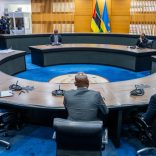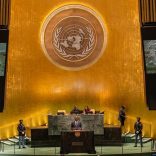Mozambique and Rwanda sign Status of Forces Agreement and APIEX- RDB MoU
Mozambique elections: CNE narrowly approves election results – AIM

File photo: A Verdade
Mozambique’s National Elections Commission (CNE) on Friday narrowly approved the results of the general and provincial elections held on 15 October.
The results, which so far are only provisional, show a victory of over 70 per cent for incumbent President Filipe Nyusi and the ruling Frelimo Party.
According to the “Mozambique Political Process Bulletin”, published by the anti-corruption NGO, the Centre for Public Integrity (CIP), nine members of the CNE voted for approval and eight against. Those in favour were the five CNE members appointed by the ruling Frelimo Party and four of the civil society appointees. Those against were the five appointees of the two opposition parties, Renamo and the Mozambique Democratic Movement (MDM), and the remaining three members from civil society.
CNE chairperson, Abdul Carimo, voted with the Frelimo group.
The eight dissenting voices immediately issued a declaration on why they rejected the results. They pointed to the evidence of ballot box stuffing, and to polling station results sheets and minutes which had “unbelievable numbers”.
They were referring to those polling stations where the staff had claimed a turnout of 90 or 100 per cent – which, if true, would mean that, in those parts of the country no voters had died since the April-May voter registration, nobody had been too ill to vote, and nobody had travelled. These absurdly high turnouts were notorious in parts of Gaza and Tete provinces. Other results sheets were so badly written that the numbers did not add up.
The CNE minority says “countless reports” reached the CNE about such frauds and blunders, and yet “We were not able to meet and take an immediate position to block the shameful spectacle of ballot box stuffing, and results sheets with incredible numbers”.
The eight pointed out that, in 2014, the Constitutional Council, Mozambique’s highest body in matters of constitutional and electoral law, had stated that the CNE “has broad legal powers to intervene in all phases and acts of the electoral process in order to ensure that they take place in conditions of freedom, fairness and transparency”. The Council had told the CNE, five years ago, that it must take whatever measures it deemed appropriate to restore electoral legality whenever it is violated.
But instead, the CNE had allowed what should be subordinate bodies, such as the Provincial and District Elections Commissions, to behave illegally and in some cases override CNE decisions.
This was the case with issuing credentials for observers. The eight said there was “a tremendous effort” by some of the provincial commissions to deny credentials to independent observers. In doing so they ignored the guidelines laid down by the CNE, in the person of Carimo himself.
Obstacles were also put in the way of political parties exercising their right to appoint monitors at each and every polling station. In many cases, the eight claimed, this right was denied, despite Carimo’s attempts to correct the situation.
There was also a “lack of transparency” in the selection of polling station chairpersons and deputy chairpersons. They were chosen by local heads of the CNE’s executive body, the Electoral Administration Technical Secretariat (STAE), without any consultation with their deputies, particularly when these had been chosen by opposition parties.
Such situations, the eight said, strengthen our conviction that, through various unconstitutional and illegal expedients and manoeuvres, “the CNE continues to have no real possibility of complying with its constitutional and legal duties, and is thus incapable of guaranteeing fair elections, with results that everyone would accept”.
The eight concluded that “in good conscience, loyalty to the law, and a sense of patriotism, we cannot approve the political farce that is brought to us here to rubber-stamp”.
The CNE will formally announce the election results at a public ceremony in Maputo on Sunday. Even then the results are not final, since they must be validated and proclaimed by the Constitutional Council.












Leave a Reply
Be the First to Comment!
You must be logged in to post a comment.
You must be logged in to post a comment.